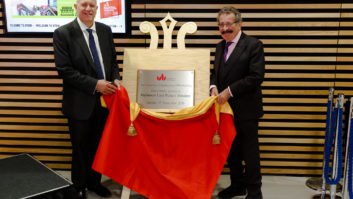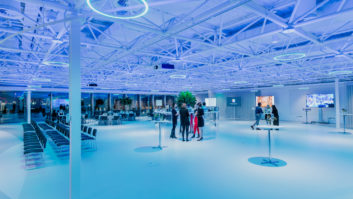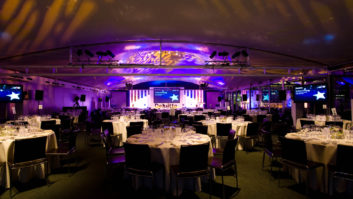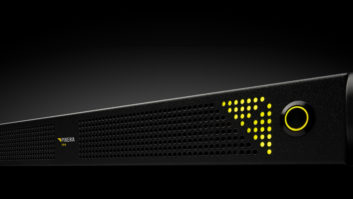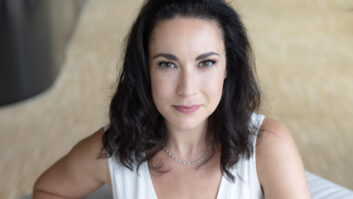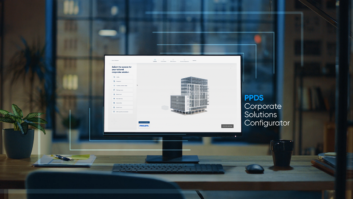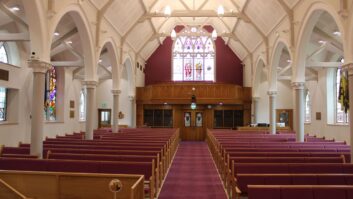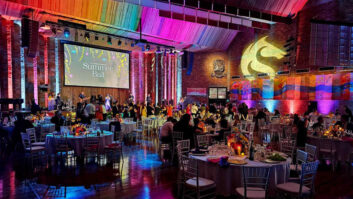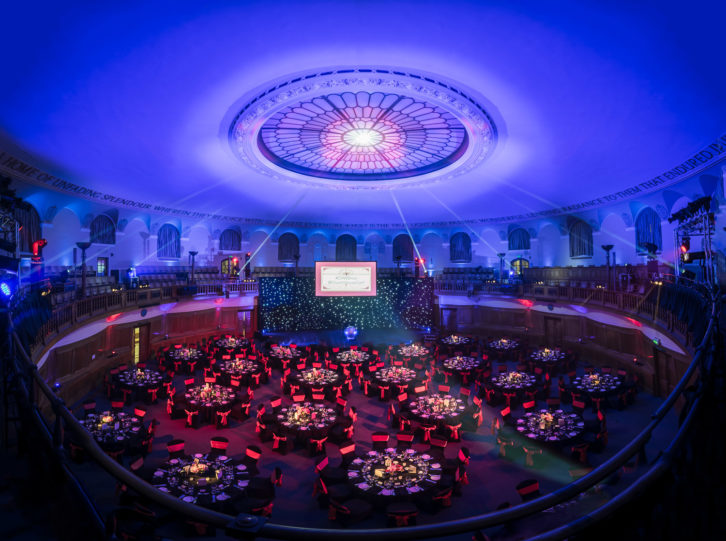
A hidden gem in the centre of London, Grade II listed Church House offers a unique event space as well as a fascinating history. Jo Ruddock caught up with AV manager Bradley Hill.
Let’s start with a bit of background on Church House.
Church House is located in the centre of London, in Dean’s Yard; we have wonderful views over Westminster Abbey and it’s a very tranquil corner of London even though we’re in the heart of Westminster. Originally the building was built in commemoration of the Golden Jubilee of Queen Victoria but before World War II it was designed and rebuilt by architect Sir Herbert Baker.
During World War II it served as a home for the Houses of Parliament and we hosted the first UN Security Council meeting here.
The conference venue itself opened in 1990 and we’ve got 19 event spaces. The largest is the Assembly Hall, a circular room that can take up to 600 people in a theatre style, and then we have 18 other very versatile spaces. We do a lot of conferences, AGMs, awards dinners, exhibitions and so on.
Does the dome shape make it more of a challenge for the AV setup?
Not really, we’ve built a lot of the infrastructure into the building. The challenge sometimes is that you can’t really re-orientate the room. With a rectangular room some people go portrait and some people go landscape, you can’t do that in a circular room.
The massive advantage that we have, because we have seven doors that go in and out it works incredibly well for events like fashion shows. The main Assembly Hall still gets used for the Church of England Synod, so before electronic voting they used to go out of doors and manually get counted. Now even the Church of England uses an electronic voting system. But you have all these doors and an internal corridor around it.
Between 1941 and 1944 it was used as the Houses of Parliament and House of Lords, even Churchill had an office upstairs, although I gather he didn’t quite like the place because he wasn’t allowed to smoke.
How big is the AV team?
It’s me plus four other people, so quite niche. I came here about 18 months ago and I just find the space phenomenal.
And what about your client base, is there anyone you work with regularly?
Our main business is political parties. We recently been working closely with the Brexit Party, we’ve had the People’s Vote come in here a lot, We’ve had the French Brexit, which was quite entertaining. They booked it for the 29 March and sang the British national anthem at 11 ‘o’ clock, followed by the French anthem when we should have been leaving. A lot of government departments come here too, including the Department for International Trade, Cabinet Office, Department for Education. Where we need to grow our business is on the corporate side; that’s my background.
Can you describe a typical day?
We’re very similar to a hotel. Hotels will book a room from say 8am until 5pm, then they’ll book dinner from 6.30 until midnight, so the change around gets quite intense. The advantage that I have is I can set up a room with all the technology for that dinner more or less at the same time I do a conference because I just change the lighting states. I think the quickest turnaround I’ve done is 40 minutes and that’s taking it from a standard conference to a quite lavish dinner.
A typical day we could have probably have 15-20 events happening throughout the building. I do bring in freelancers as we are quite a small team. But when we say we’ve got 19 meeting rooms, four of them can hold 20 people so the support is pretty simple. You may have an event from 9am-1pm then they’ll go off to another room and do something from 2-6 so the rooms are utilised a lot.
I do train my guys a lot and my last two employees had never been in the industry before. It was a gamble that I took – they both studied at university doing events and sound and they were more on the technical side, they used to work for a particular supplier. So I thought if you can deal with the fault finding on AV equipment you should be able to actually make it work properly, and quite honestly over the past year they’ve been my best people.
I came into the AV industry 23 years ago, I used to be an estate agent. There was a mis-sent fax to the estate agents’ office and the company was looking for people; I’d been in estate agency for ten years and I hated it. I rang them to let them know the fax had been mis-sent and they asked if anyone there was interested so I read the description and said yes, I am.
In this industry, for me, you don’t really have to have an official qualification, it’s attitude and people who enjoy doing the job. OK, the hours can be quite stressful, clients can be demanding but the end product it’s entertaining and it’s great, and my guys learn day by day.
Do you think hiring from outside of the industry is going to become more common?
I look at it in two ways. If you’re a production company or a lighting company and you’re dealing with very large events, conferences, festivals etc, you do need specialised. Nowadays, depending on the areas you’re looking, at Church House we can do full on events or small, intimate 20 people in a room events. Sometimes if you do a big event it’s going to be 70% technical ability, 30% client handling, and that’s where I come in as I deal with the clients.
But if you’re dealing with a small meeting room it’s 70% client handling, 30% technical, because technical is quite simple. So it’s getting that balance of someone who you can put in front of a CEO or director who you feel can converse with them politely.
There are good people out there but you have to whittle it down to find someone who’s interested in one day doing a conference about the price of coffee and the next minute doing the PinkNews Awards. You have to have the boring with the exciting, some people like the boring and some like the exciting, but again it’s about finding that happy medium.
Have you standardised you rooms when it comes to the technology within them?
A basic room will have a built-in LED screen and a pretty simple conference phone. Bigger rooms will have a mobile PA system, and the main rooms will have state-of-the-art projection. The Assembly Hall has a 6m wide screen, laser projectors, an Avolites Arena lighting desk that we can control 360 moving heads on. At the moment I’m about 338 short. We have a brilliant switcher that does 4K, and our projectors are 4K, and we have a [NewTek] Tricaster so we can stream everything via the internet – we have built in cameras. I get a budget every year to upgrade and improve. Now I spend it wisely, on things that give us a return and are practical, not things that just look good. We’re really up to date on our equipment, We use digital mics, all encrypted, so you can’t get any external break-ins – a lot of the government departments like that.
I can put as much as I can in the building but I try to make it look sympathetic. AV should be seen when it’s needed and not seen when it’s not needed.
We are respectful with the building – it’s owned by the Church of England, it’s basically their HQ. We use about 25% of it, the other 75% is still offices within the corporation.
It’s such a flexible space though. We can put bands in there. A lot of venues these days have noise restrictions in place; we did a test recently and we got it up to 110dB and you couldn’t hear anything externally, so as a venue it’s great.
We also have in-house caterers so I’m now talking with the chef to see how technology can work with food. You get people coming in with dry ice and it all looks fancy. We have UV lighting here so we’re trying to come up with a dessert that glows a little bit. It’s utilising the caterers and the technology. We’ve had clients where instead if having a menu on the table, we’ve recorded the chef and he talks you through your meal – it’s just doing things slightly differently because we can.
Do you think clients now expect more from their events then maybe a few years ago?
That’s a good question. Like everything from my side it’s about understanding the client, what they want to do and how they want to achieve it; coming up with ideas for them. Regarding the other team around me, the event co-ordinators, floor manager and the like, they’re the ones focused on creating a client experience here. We pride ourselves on when clients come back and say that was phenomenal. We are more personal that a lot of other venues, we spend time getting to know the client and I always try to bring a technician in to a client meeting so they get a feel for what the client wants and they can come up with ideas. We’re here to try to make an event memorable.
Are there any pieces of AV kit you particularly enjoy working with or you’d like to have at the venue?
Lighting does so much to an event. It gives you an experience. I’ve used modern day lighting, I’ve even bought back lasers on some occasions; they can do wonders. It’s fun, especially when you do an awards.
